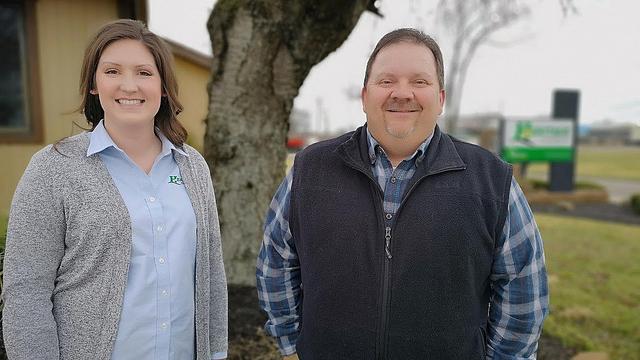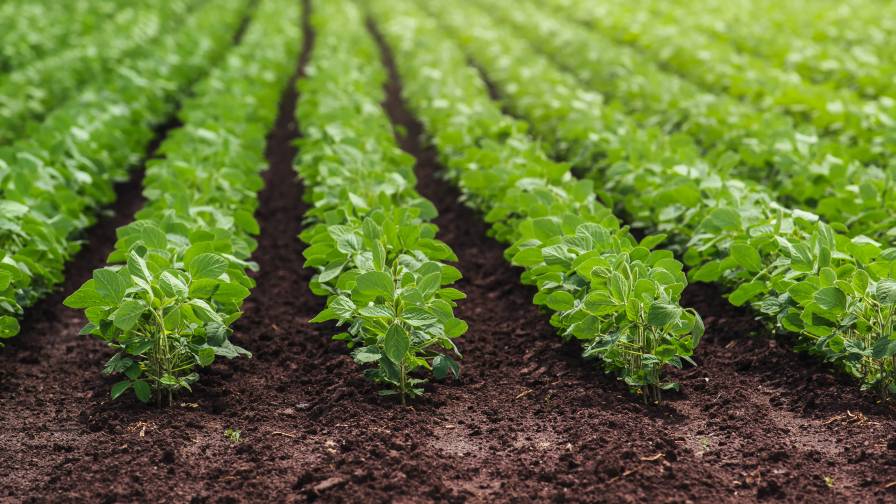Dicamba Update: Heritage Cooperative’s Success Story

Jennifer Cox and Greg Spears at Heritage Cooperative’s New Philadelphia, OH, branch.
When the opportunity presents itself to get off the phone and meet in person, we take it.
CropLife recently had the chance to sit down with Heritage Cooperative’s Greg Spears, Chief Operating Officer, and Jennifer Cox, Director of Crop Protection Marketing, at the Ohio company’s New Philadelphia branch, about 90 minutes down the road from Meister Media Worldwide headquarters.
Heritage Cooperative, ranked no. 46 on the CropLife 100, expects its dicamba sales to more than double in 2019. While retailers and applicators aplenty have relayed trying experiences with drift, Heritage reports relatively few problems. Cox and Spears chatted on what they believe are the reasons for their success, now headed into the third season with dicamba-resistant technologies.
CL: How has your experience at Heritage been with two seasons of custom dicamba application behind you, and where are you at right now?
Cox: So far, so good really. Two years ago, we would have just done a couple of hundred acres, where we kind of got our feet wet. There was still so much unknown at that point, as far as what the rules and regulations were. There was some confusion. They’ve done a really good job of cleaning a lot of that up, so much so that this year’s dicamba trainings were of more of a refresher than anything, which was nice. We just finished those two weeks ago.
We had six Heritage-sponsored grower trainings across our geography in Ohio, and also an in-house custom applicator training specifically around dicamba. They went really well and were well attended.
CL: Did you have many more people to train because of the new regulation that uncertified people can no longer apply dicamba under the oversight of someone certified?
Cox: Honestly, that is our biggest hurdle this year. In the past, things have gone pretty smoothly. We are on track now to more than double our dicamba business from last year, just through prepays currently.
That was the biggest headache, the new verbiage that says you must be your own custom applicator. The way the Ohio Department of Agriculture is choosing to interpret that also states that, (for example) our tender truck drivers, and anyone who helps mix a load or clean out tanks all have to be certified as well. That was big for us. Truck drivers aren’t certified applicators – if they were, they’d be in a rig.
We put together a plan, and we’re in good shape now, but it was probably two weeks of extra time that we devoted just to operations staff that we wouldn’t have done specifically around dicamba in the past. We did a full two-day training to get all of those guys certified. It’s not the easiest test in the world, and there are all the certifications that come with it. We are thankful for our partner organizations, especially WinField for taking the time to help us with that. We had a 94% pass rate, which was awesome.
The question still comes, what about seasonal drivers? There is still some grey area. ODA wants to say, you have to be certified if you’re a truck driver, but what if a truck driver never opens a jug? So there is still further clarification needed about some of those things. I understand why they did it – it’s all about tank cleanout. Monsanto says that is where they saw one of the bigger problems last year, in tank and hose contamination more than misapplication.
We’ve put more measures in place ourselves to help us with (tank cleanout procedures), too.
CL: What are those measures?
Cox: We did the two-day training to get them certified for their test to become a certified applicator, then we just did a hands-on, full-day operations training with a rig about how to calibrate and clean out a tank, how to check your nozzles, how to measure boundaries in a field, and so on.
It was very hands-on, in the field, with the machine. We have anywhere from brand new guys to guys that have been doing this for 40 years. Everybody needs a refresher, and some need more than a refresher. Those were good, and probably a step up from what we’ve been doing in the past.
There’s the basics for everything, and this is a whole other addition. I think it will make our guys better applicators about everything. It forces them to pay more attention to everything.
CL: Did your customers want this technology because they needed it, because they were struggling with resistance?
Cox: Yes and no. About half of our guys are buying dicamba-traited seed because it’s the newest and greatest genetics.
Spears: First and foremost, it’s all about the genetics and seed and varieties. The luxury piece of it is the grower has the option now to use the dicamba piece if need be, but there will be several that don’t. They’ll use a normal Roundup Ready (spray) program.
It’s all a matter of genetics. Some people won’t give Bayer credit, but it gives the grower options to utilize, depending on the situation or problem, with what I consider are the best genetics that are out there.
CL: How much of of what you sell is dicamba-traited vs. the older genetics?
Spears: Seventy-five percent-plus of what we sell is dicamba-traited.
Cox: Of that, a third of that might get sprayed with dicamba, maybe a little more.
CL: Is it because it’s more expensive and more of a hassle to spray dicamba?
Cox: The program, cost-wise, fits in with some of the other options. It’s a little more of a premium, but not a hindrance, though, to why guys would spray it or not spray it.
Spears: It’s the intimidation of the rules and regulations. It’s fear of the unknown.
Cox: I think that (fear) was probably one of our custom applicator struggles last year. It was so new; it was a little confusing until you broke it down. We took a field map one day and said, let’s talk about what the barriers would be, and what you would need to pay attention to on this field. They need to do that with most of what they spray anyway; this is just making them be even more accountable for it.
Spears: We knew sitting here as an ag retailer that also offers custom application, that the first place the grower was going to look until they were comfortable enough to self-apply it, was to ask someone else to apply it and take the risk.
From our standpoint, if we’re going to be in the custom application business, we have to be prepared and do all the right steps to be good stewards. That’s why were in the business. We want to utilize the best technology and traits that the industry has to offer for our customers and apply it where we’re needed and do it correctly.
Cox: And we think we can. We can handle the additional steps needed to do it and do it safely in a time-efficient manner. That’s been a question posed by many in the past is, can we still get everything else done when this requires more time and attention? And we can, we just have to pay attention.
CL: Do you charge more for dicamba application?
Cox: We do not.
Spears: We should (laughs).
Cox: We said, if we’re going to be in custom application business, we should apply it. We do ask our growers for a few additional things that will help us determine the regulations around it, as far as what is in adjacent fields and sensitive crops that we need to be aware of. We ask for more information to expedite the process, but we don’t try to make it a hindrance.
CL: As ag retailers, how much more demanding of your time is dicamba today?
Cox: It might have initially two years ago. But now, I don’t feel like it was this year. Having to be a certified applicator was a hurdle, but at the end of the day, it puts us in a better position that we have that many more guys that are certified applicators, and that’s great. It costs $35 dollars; it’s not a big deal.
Our applicators are the backbone of our business. We couldn’t do what we do without them. It’s been well-worth the additional time and training and support for that group this year.
Spears: (Dicamba) has made our people better, because of the additional training. Our guys in machines realize they are responsible for a lot behind that wheel. It’s critical.
CL: Will you be looking to other new technologies in 2019, like Enlist and GT27?
Cox: We’re dipping our toe in Enlist this year. We have two growers that are growing the seed for it, but it will all be grower-applied at this point.
Spears: If anything, it sends a signal to manufacturers like Bayer and Corteva, that if we’re going to get behind it, we’re going to do all the right steps along the way to meet all the rules and regulations.
It helps our business to those who are creating these technologies in the future: Heritage Cooperative is willing to do the right things to steward this program.
Cox: We’re looking for the partner that wants to do the right thing, too. We’ve chosen a partner of all of the dicamba technologies (Bayer/Xtend), and we’ve chosen a partner on the adjuvant side as well (WinField). There are a lot of them out there, and some put more time and research and show that, and have a good message to share with the grower as to why their products perform better and make sure we don’t have issues with dicamba.
CL Do growers ask for anything else different?
Cox: Some may ask, but we make efforts to educate them on why we’ve chosen those products. There are questions, especially about 3-in-1s that might be cheaper. WinField’s products are more of a premium, for good reason – there is research and data that support why those products are superior to some of their competitors. We want to use the best products on those acres.






